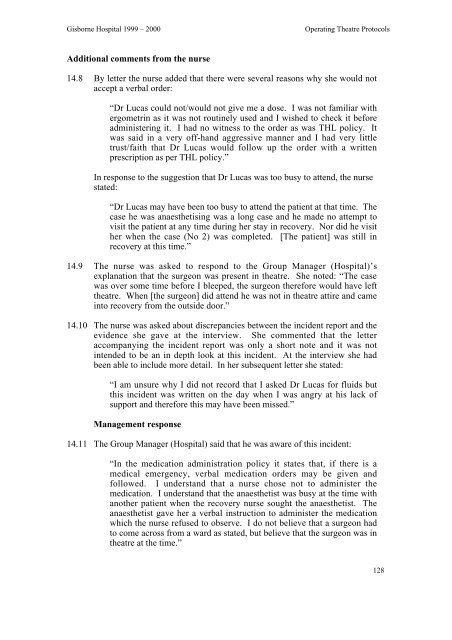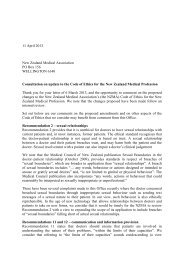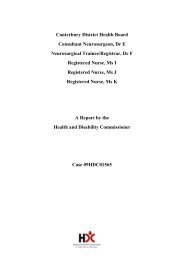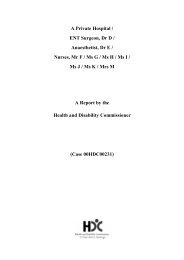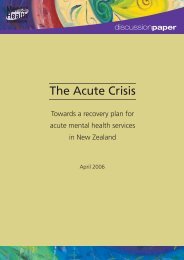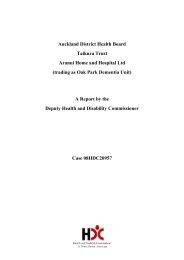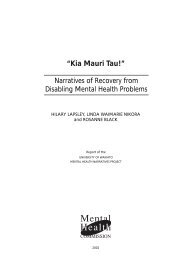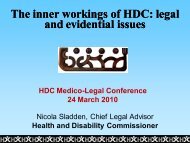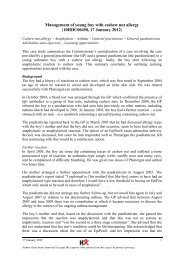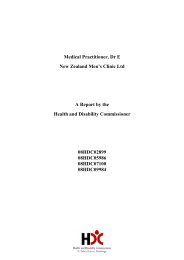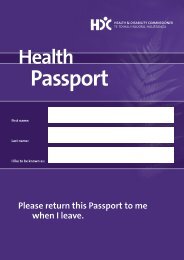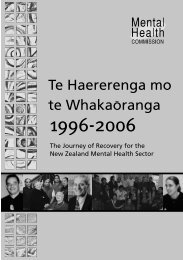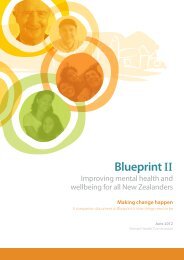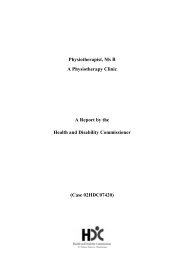Gisborne Hospital Report - Health and Disability Commissioner
Gisborne Hospital Report - Health and Disability Commissioner
Gisborne Hospital Report - Health and Disability Commissioner
Create successful ePaper yourself
Turn your PDF publications into a flip-book with our unique Google optimized e-Paper software.
<strong>Gisborne</strong> <strong>Hospital</strong> 1999 – 2000<br />
Operating Theatre Protocols<br />
Additional comments from the nurse<br />
14.8 By letter the nurse added that there were several reasons why she would not<br />
accept a verbal order:<br />
“Dr Lucas could not/would not give me a dose. I was not familiar with<br />
ergometrin as it was not routinely used <strong>and</strong> I wished to check it before<br />
administering it. I had no witness to the order as was THL policy. It<br />
was said in a very off-h<strong>and</strong> aggressive manner <strong>and</strong> I had very little<br />
trust/faith that Dr Lucas would follow up the order with a written<br />
prescription as per THL policy.”<br />
In response to the suggestion that Dr Lucas was too busy to attend, the nurse<br />
stated:<br />
“Dr Lucas may have been too busy to attend the patient at that time. The<br />
case he was anaesthetising was a long case <strong>and</strong> he made no attempt to<br />
visit the patient at any time during her stay in recovery. Nor did he visit<br />
her when the case (No 2) was completed. [The patient] was still in<br />
recovery at this time.”<br />
14.9 The nurse was asked to respond to the Group Manager (<strong>Hospital</strong>)’s<br />
explanation that the surgeon was present in theatre. She noted: “The case<br />
was over some time before I bleeped, the surgeon therefore would have left<br />
theatre. When [the surgeon] did attend he was not in theatre attire <strong>and</strong> came<br />
into recovery from the outside door.”<br />
14.10 The nurse was asked about discrepancies between the incident report <strong>and</strong> the<br />
evidence she gave at the interview. She commented that the letter<br />
accompanying the incident report was only a short note <strong>and</strong> it was not<br />
intended to be an in depth look at this incident. At the interview she had<br />
been able to include more detail. In her subsequent letter she stated:<br />
“I am unsure why I did not record that I asked Dr Lucas for fluids but<br />
this incident was written on the day when I was angry at his lack of<br />
support <strong>and</strong> therefore this may have been missed.”<br />
Management response<br />
14.11 The Group Manager (<strong>Hospital</strong>) said that he was aware of this incident:<br />
“In the medication administration policy it states that, if there is a<br />
medical emergency, verbal medication orders may be given <strong>and</strong><br />
followed. I underst<strong>and</strong> that a nurse chose not to administer the<br />
medication. I underst<strong>and</strong> that the anaesthetist was busy at the time with<br />
another patient when the recovery nurse sought the anaesthetist. The<br />
anaesthetist gave her a verbal instruction to administer the medication<br />
which the nurse refused to observe. I do not believe that a surgeon had<br />
to come across from a ward as stated, but believe that the surgeon was in<br />
theatre at the time.”<br />
128


